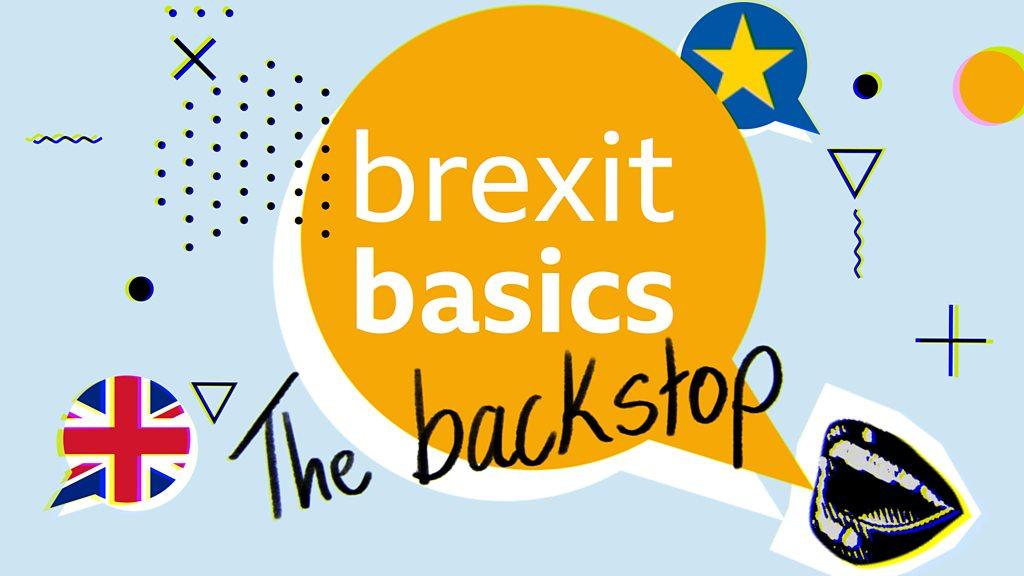Brexit: What's in the political declaration?
- Published
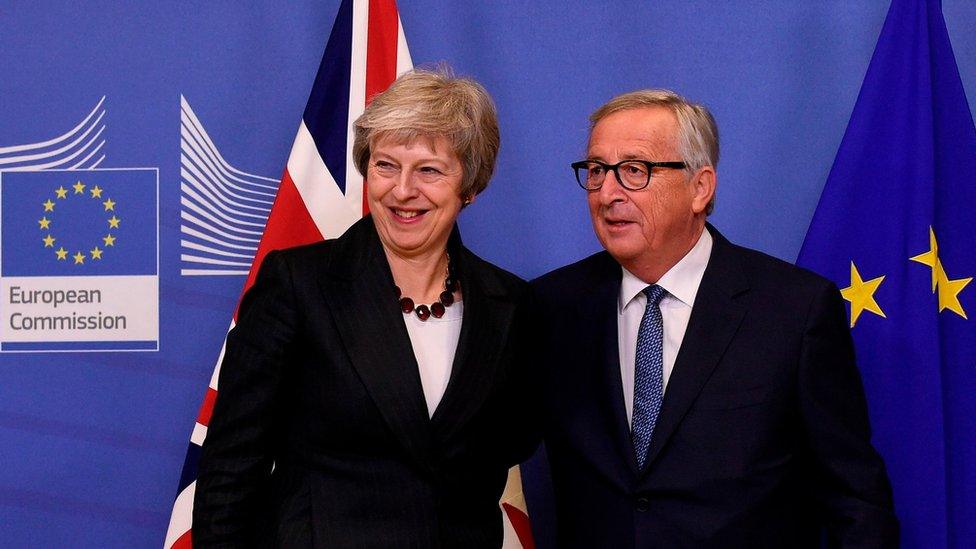
The draft political declaration, external on the future relationship between the EU and the UK, after Brexit, is out. Theresa May describes it as the right deal for the UK.
A few points to remember…
This is not a legally binding document.
It's not very long either, but it has grown from last week's seven-page outline to 26 pages. It sits alongside the 585-page Draft Withdrawal Agreement (which will be legally binding if it gets ratified).
This is also a draft, agreed by negotiators, but it still needs to be approved by the leaders of all 28 EU countries at a summit scheduled to take place on Sunday. Don't expect major changes.
Formal negotiations on everything it contains can only begin after Brexit has actually happened - currently after 29 March 2019.
It contains plenty of aspirations involving shared interests, close partnerships and ambitious co-operation, but many of the details are still to come.
Here's an initial look at what's in the text:
Future relationship
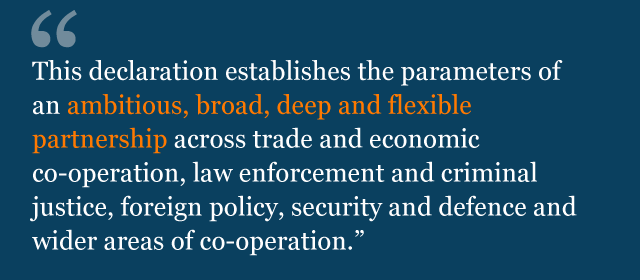
A reminder that this really is about everything, not just about trade: the entire scope of the future relationship between the UK and its nearest neighbours.
Both sides want that relationship to be as close and co-operative as possible but that aspiration will be tested in the years ahead.
Again, it's worth emphasising that this is not a legally binding document, so there are no guarantees about what the post-Brexit world will look like.
And no-one can say for certain how long it will all take to negotiate.
Bottom lines
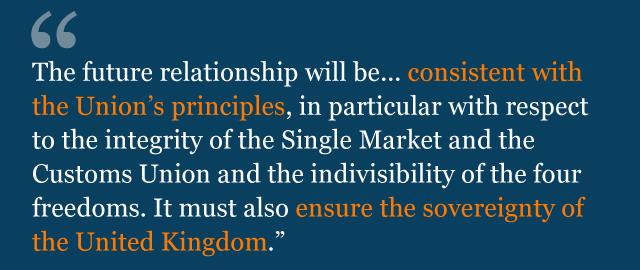
The bottom line of both parties is included early on.
Anything that is negotiated must be consistent with the EU's four freedoms - the free movement of goods, services, capital and people.
And nothing will be agreed that threatens the sovereignty of the United Kingdom.
As we've seen for months now, the issue of the Irish border is where the combination of these core principles becomes most complicated.
Trade in goods

So trade in goods should be "as close as possible", but that's not the same as being frictionless.
It leaves a lot of wriggle room in negotiations, with no guarantee of the final outcome.
The two sides are committing themselves to an "ambitious, wide-ranging and balanced" economic partnership, based on a comprehensive free trade agreement.
But there is also repeated emphasis that there must be a level playing field, which ensures open and fair competition.
The more economic rights you retain, the EU is reminding the UK, the more obligations to which you have to sign up.
Customs
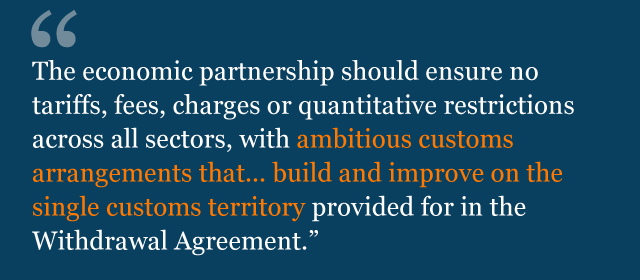
When the outline of this draft emerged last week, this was a notion that raised alarm bells for many supporters of Brexit.
Dominic Raab mentioned it in his resignation statement. Their fear, which will not be dispelled by this draft text, is that temporary customs arrangements could easily turn into some form of permanent customs union, preventing the UK from doing its own trade deals on goods around the world.
The government denies this, and argues that there is nothing wrong in wanting ambitious customs arrangements in the future, including the need to avoid checks on what are known as "rules of origin".
The declaration also mentions explicitly an "independent trade policy" for the UK in the future.
Irish border
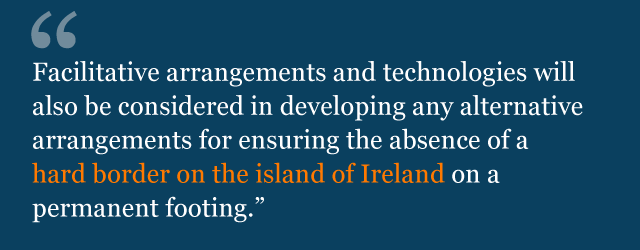
We are, this emphasises, open to any solution that will avoid the proposed backstop solution, to keep the Irish border open.
That includes technological and other solutions that critics of the Brexit negotiations say have been ignored for too long.
The trouble is that technological solutions that avoid the need for any border infrastructure are not in operation anywhere in the world.
Regulations
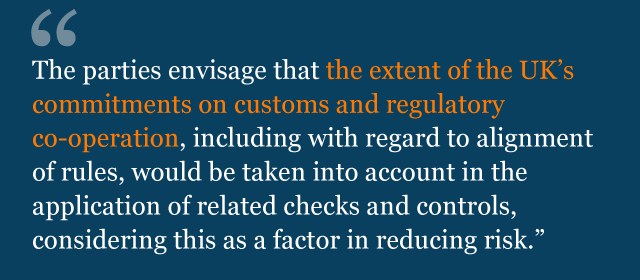
UK officials see this as a key sentence, which suggests there is plenty of room for manoeuvre in the negotiations to come.
It makes clear, they argue, that it is not the case that the UK can only have either a basic free trade agreement (like Canada) or membership of the single market (like Norway), with nothing in-between.
But none of the language here commits the EU to anything specific.
Trade in services
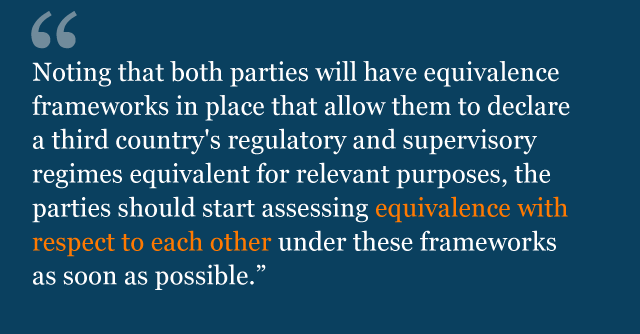
As expected, the regulation of financial services will be based on a system of "equivalence" and the aim is to negotiate the details in this key sector before the end of June 2020.
There's nothing in the language here to suggest that the UK will get better terms than any other third country dealing with the EU - but that will be a key negotiating aim.
There are also plenty of aspirational words on "ambitious and comprehensive" plans for the service sector in general, but there is an awful lot to negotiate.
Digital commerce
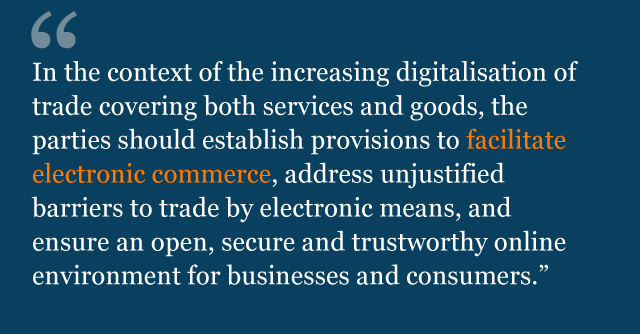
There are plenty of nods towards the way the world economy is changing, and the importance of comprehensive agreements on data.
The UK hopes that in the negotiations to come, it can be well positioned to take advantage of new technologies and the digital economy.
But the EU has already made it clear that the UK cannot expect to have the same access to all EU databases - in various economic and security areas - as it would have as an EU member state.
Freedom of movement
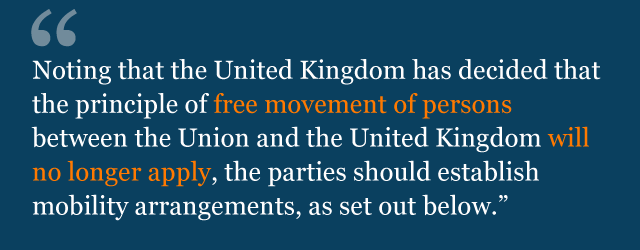
This fulfils the prime minister's pledge that the UK will take back control of its borders and free movement of EU citizens to the UK will come to an end. But it means, of course, that free movement for UK citizens travelling to the EU will also stop.
The document says both sides want to preserve visa-free travel for short-term visits (don't worry about your holidays) but it suggests by implication that visas could be introduced for longer stays.
Fishing rights
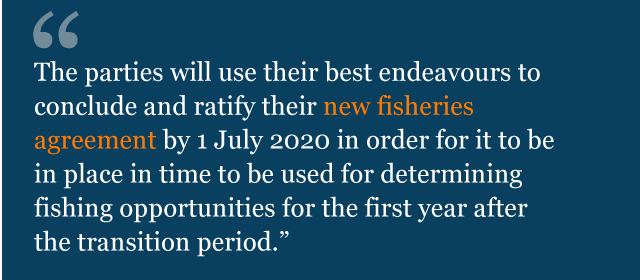
There is neutral language here, including the "best endeavours" principle that commits both sides to doing everything they can to reach a deal.
But that disguises the fact that there are still deep disagreements on fishing, and on getting the right balance between access for UK produce to EU markets, and access for EU boats to UK fishing waters.
Expect this one to run and run, because the UK is not alone in having a vocal fishing lobby with more political power than its overall contribution to the economy might suggest.
Security

There is a lot in this document on security - both on internal police co-operation and on broader foreign policy and defence co-operation.
The EU needs the UK in many of these areas, but the draft makes clear that - on internal security matters in particular - there is a variety of legal and technical issues to overcome.
We can expect, though, that UK and EU foreign policy will be co-ordinated as closely as possible in the future.
Disputes and courts
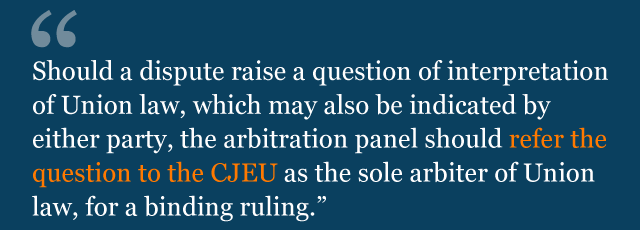
Rather like the Draft Withdrawal Agreement, the political declaration envisages a system of dispute resolution involving a joint committee and an arbitration panel.
But once again, on matters of EU law (and there will be a lot of that involved in any future relationship) the final word will rest with the European Court of Justice.
The government will point out that after Brexit the direct jurisdiction of the ECJ in the UK will come to an end.
Timing
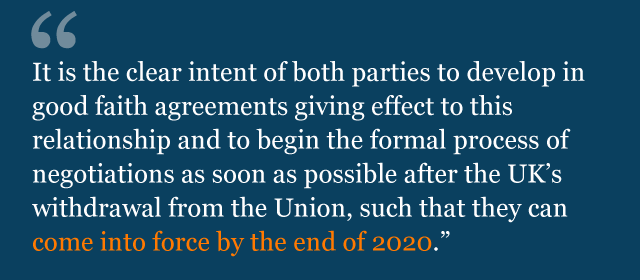
There is a plethora of other issues in the draft document that this article hasn't covered: transport, energy, intellectual property and so on.
Both sides say they hope all these issues and more can be wrapped up by the end of 2020. It's an ambitious timetable.


- Published23 December 2020
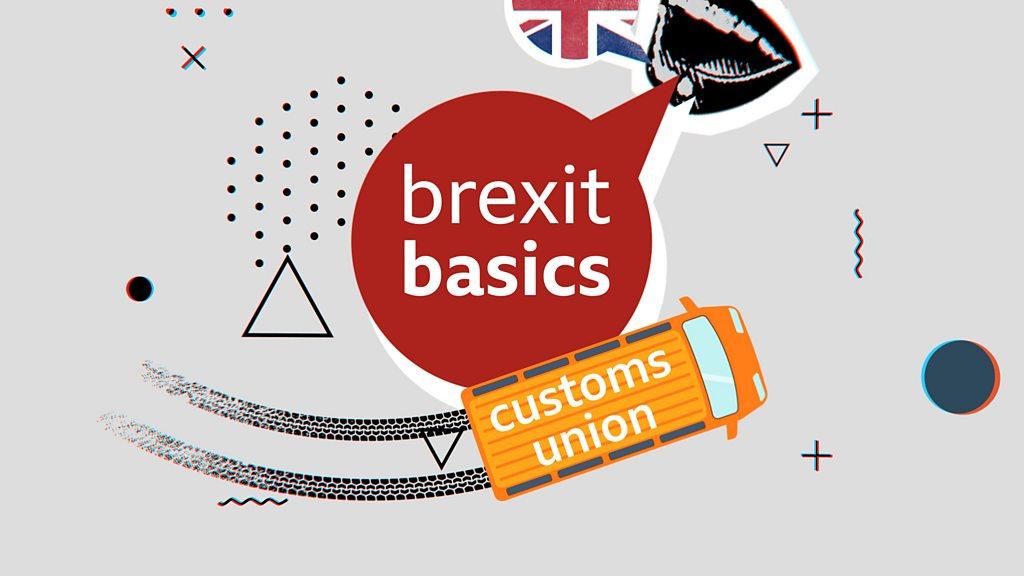
- Published3 February 2020
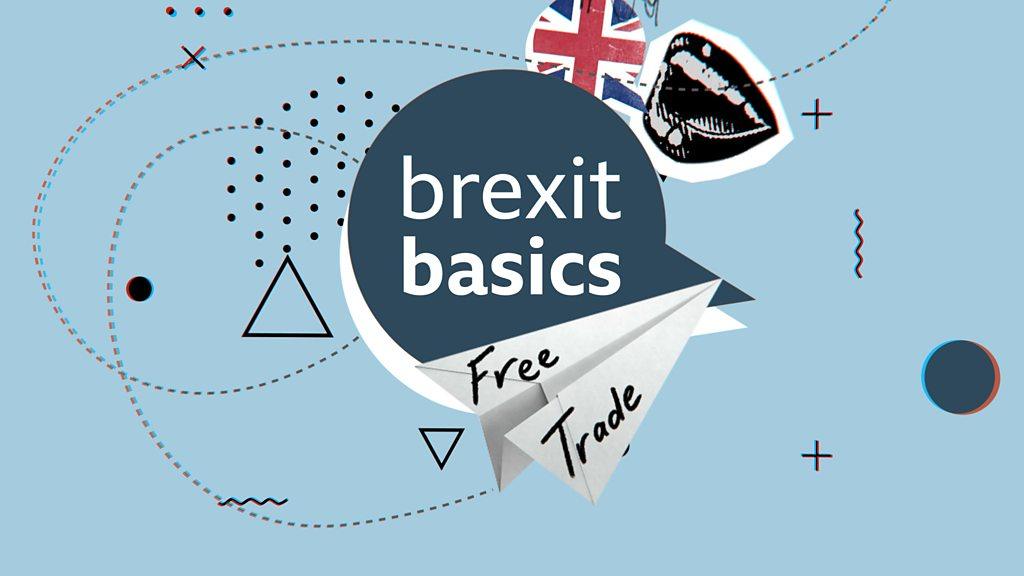
- Published1 February 2020
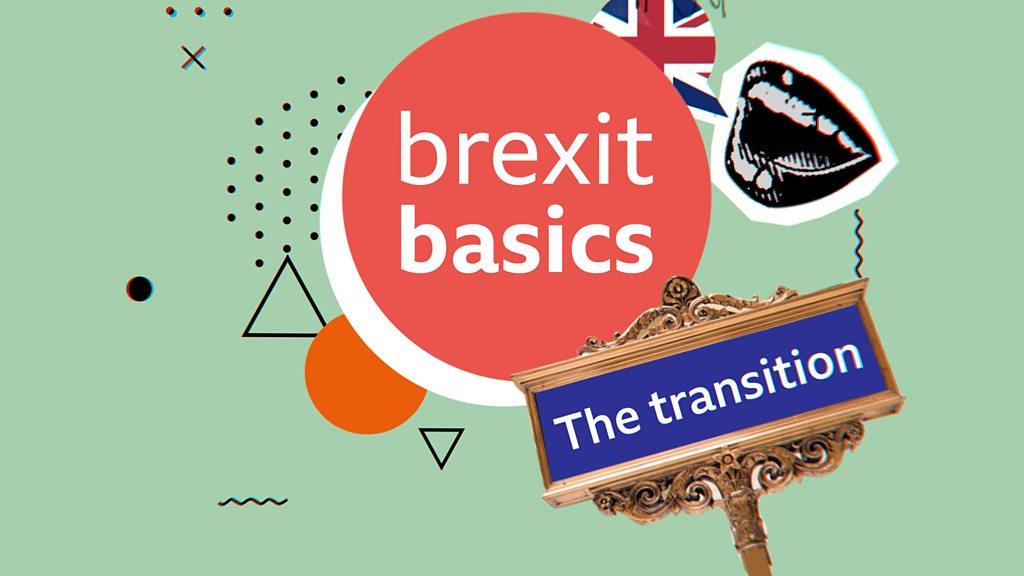
- Published13 September 2019
